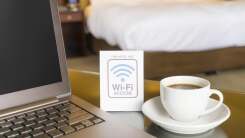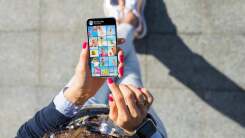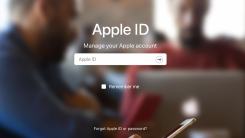How to Stream Google Stadia on iOS/iPadOS
In a perfect world, we could download apps from a centralized, secure app store on our phones, and these apps would allow us to connect to other servi

Keep your keycard with you, don’t leave valuables in your room unattended, and keep the door locked. Most of us follow basic security precautions at hotels, but I’m begging you to add one more to the list: Don’t use hotel wifi without protection from a VPN.
Connecting to a public network is a risk anywhere—coffee shops, libraries, and airports—but hotels are one of the worst since hackers have so many possible targets using the same connection. Password-protected networks aren’t much better; they may keep out the cheapskates trying to mooch off the public wifi, but fellow users can easily intercept web traffic if they know what they’re doing.
It’s not just the hotel’s official wifi networks you have to worry about, either. Other visitors may have set up a router or personal hotspot in their room that shows up in your device’s available networks list, but most aren’t doing so out of kindness. Chances are they simply don’t know how to configure the security settings on their device, but it’s also possible they want to dupe others into connecting to their network so they can spy on you. And even if it is an honest mistake, connecting to an unsecured network is still a risk (and could eat into the poor person’s data plan), so make sure you’re connecting to the right public network in the first place.
VPNs keep you safe by encrypting your device’s connection to the websites and servers you’re accessing and obfuscating your location and IP address by funneling your traffic through a proxy server, which prevents outside parties from snooping on your online activities. Most folks use VPNs to keep ISPs and data trackers out of their browsing data, but there are even more eyes that could be watching while you’re on public wifi, making them more important when you’re sharing the same network with others.
But while using a VPN is easy, not all are safe to use—especially not on public wifi, since many “no-log” VPNs secretly track you and may accidentally leak your data. The key is finding the right VPN, but that can be difficult. At the very least, don’t use a free VPN. Paid VPNs can be a crapshoot, too, but they’re (usually) they’re better than nothing and should give you enough protection so you can do basic online tasks.
EpressVPN, NordVPN, and Proton VPN often get high marks, and I’ve used happily Surfshark for a couple of years with no issue. You probably even have a discount code for one of these services courtesy of your favorite podcast or YouTube channel, just make a point to check professional and trustworthy reviews online before you subscribe.
As for smartphones, some mobile browser apps like Vivaldi and Opera have built-in VPNs, but you’re better off signing up for a paid VPN app instead. Just don’t use free VPN apps from your device’s app marketplace.
A VPN should be enough protection to safely engage in most online activities over the hotel wifi, such as streaming video and music or catching up on the news. However, you should employ other data security measures even if you’re using a secure VPN at all times, such as enabling DNS over HTTPS (DoH). DoH adds an extra layer of security to your web traffic by obscuring what websites you’re accessing (it’s more complicated than that, but that’s essentially the end result), and DoH can be enabled on many browsers or at the system-level on Windows 10.
Finally, even with a VPN and other security settings like DoH turned on, we strongly recommend you only do important work over mobile data. As we’ve previously explained, the safest strategy is to forego hotel wifi entirely and use your cellular connection wherever possible. At the very least, don’t log into your bank account or access sensitive information while on wifi.
More on VPNs from G/O Media’s partner:
- Best VPNs
- Best Free VPNs
- Cheapest VPNs
- NordVPN vs ExpressVPN
Lifehacker is not involved in creating these articles but may receive a commission from purchases through its content.

In a perfect world, we could download apps from a centralized, secure app store on our phones, and these apps would allow us to connect to other servi

Bluetooth is convenient AF when it works and annoying to troubleshoot when it doesn’t. Conceptually, it should just... always work. One device pairs w

We all want to know who’s lurking on our social media profiles, but the truth is that none of the major social media platforms will let you access thi

Does this sound familiar? You’ve taken such good care of your older MacBook that Tim Cook himself wouldn’t be able to tell it from a fresh out-of-the-

Remember HDTV? Full 1080p? Well those days are long gone, baby! Now 4k is the minimum acceptable definition you want to watch anything. Otherwise, wha

One of the most exciting features that Apple announced at WWDC 2021 was Universal Control. This feature lets you seamlessly switch the cursor and keyb

It’s easy to forget the password to an account like Apple ID. While it’s integral to your entire Apple ecosystem, it’s likely not an account you sign

Whether you changed internet service providers (ISPs) or need to upgrade your password, switching your wifi comes with some challenges. Manually conne
We are a comprehensive and trusted information platform dedicated to delivering high-quality content across a wide range of topics, including society, technology, business, health, culture, and entertainment.
From breaking news to in-depth reports, we adhere to the principles of accuracy and diverse perspectives, helping readers find clarity and reliability in today’s fast-paced information landscape.
Our goal is to be a dependable source of knowledge for every reader—making information not only accessible but truly trustworthy. Looking ahead, we will continue to enhance our content and services, connecting the world and delivering value.